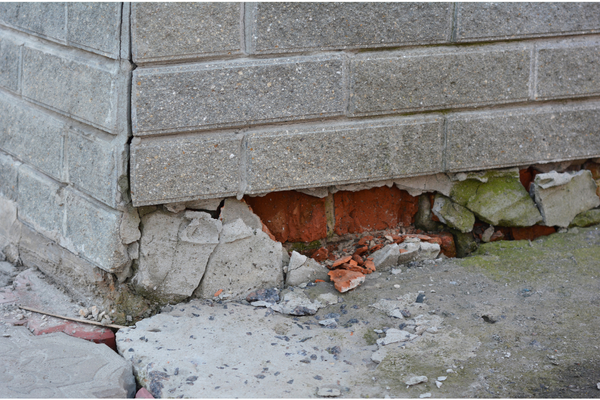As one of the most trusted foundation repair specialists in the region, we get asked a lot when foundation settling can turn into foundation problems or if foundation settling requires repair from the get-go. It’s an understandable worry. We think of our houses as solid structures, building our lives around their stability by using them as investments for the future, a place to store property, and homes to raise a family in. Understanding what settling is and how it affects your home is a good place to start.
Houses Will Settle
The fact is the solid ground your house is built on isn’t quite as solid as our senses lead us to believe. Soil is porous, and it swells and contracts according to the moisture present in it. The solid parts of soil can shift with these movements, and with the tremendous weight of a house on top of all that motion, gravity takes over. Every building settles slowly. With proper excavation and construction, this can be no more than a few inches, which most structures can withstand readily. When foundation settling happens too fast, unevenly, or settles too much, it can lead to foundation problems that jeopardize your home.
Settlement Factors
There’s no way to ensure how fast or slow a house will settle, but there are risk factors that can help point to potential future problems. If your home has these risk factors, it’s not a guarantee you’ll need foundation settling repair, but it can give you an idea of what to watch out for.
- Built During An Extended Drought – Extended droughts can see soil contract, but voids can develop where the water has been leeched out. When rain does return, the soil’s composition can change rapidly, leading to instability. Worse, if your home was built after a small rainy period in the middle of a drought, the ground may not have been properly prepared, further increasing your risk both when the land dries back out and when the drought breaks.
- Shrinking Concrete – As concrete hardens and cures, it shrinks. This is a normal process that we commonly see when waterproofing basements where the concrete has pulled away from the walls. With uneven shrinkage, you get uneven settling of the house, leading to increased stresses throughout the house.
- Bricks Swell – Made of clay, bricks are popular building materials. Over time, they tend to swell with moisture gain. This uneven swelling can put just as much stress on your home’s structure as a shrinking foundation. This can especially be an issue during years with hard freezes since water also expands under these conditions. The result is more than just foundation expansion but foundation fluctuation that can easily lead to the need for foundation settling repair to get your home back on a solid footing.
Signs of Foundation Problems
To know whether your foundation settling is putting your home in jeopardy, you need to understand what to look for. You will see signs of foundation problems long before the damage becomes irreparable. The problem is that too many people ignore these signs rather than addressing them–either out of ignorance or out of concern for the cost of repair. Unfortunately, waiting often results in saving a dollar today to spend two tomorrow.
- Deep or Wide Foundation Cracks – Small surface cracks are common after normal foundation settling and often don’t require repair. Foundation settling that leads to large cracks ⅛” wide or greater, however, should be evaluated by a professional.
- Cracked Walls – Cracked walls in the basement are a sign that foundation problems may exist and that repair or wall anchors may be needed. Cracks in the walls of your home’s above-ground living area–especially diagonal cracks or those that don’t run along the intersection of drywall panels, are a sign the foundation under your home has settled and shifted to the point of straining your above-ground structures.
- Stuck Windows and Doors – Another sign of strain working its way through your home’s bones is doors and windows that stick frequently or no longer close completely. Set when your home is first constructed and sits plumb, shifting of your home’s foundation moves them out of alignment, making them increasingly difficult to use over time.
- Roof Issues – As your foundation settles, your roof sits at the end of its support structures which act as levers prying its components apart. This can result in leaks, creaks, and a weaker shelter from heavy winds, rains, and snow.
- Flooding – As your foundation settles, swells, or contracts, your basement may no longer be able to hold out the water present in the soil surrounding it. This is a problem that compounds itself, as flooding can further the foundation problems you’re already experiencing.
What You Should Do About Foundation Settling Problems
If you suspect foundation settling has progressed too far and is putting your home at risk, you need to contact an experienced foundation settling repair specialist immediately. With decades of experience working with local homeowners, we’re ready to help you understand the dangers your home faces and the options you have to put your home back on a more solid footing. There’s no cost or obligation to get started.
Request your free home foundation inspection, and we’ll make an appointment to visit your property, inspect any damage, and look for further risk factors that could be putting your property in danger. Afterward, we’ll talk to you about repair and preventative options with real quotes that give you the actionable information you need to make the decision that’s right for your family’s home and budget.
We stand behind our service with a reputation that’s been earned in our community, one saved home at a time. We use quality American-made materials and the latest techniques to correct foundation settling, prevent basement flooding, and restore your home’s integrity. Protect your home with the professional help of AM Wall Anchor & Waterproofing today.

